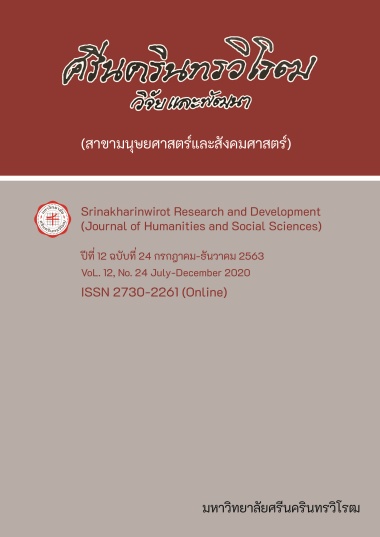การพัฒนาแบบจำลองความสัมพันธ์เชิงสาเหตุของปัจจัยที่มีอิทธิพลต่อความร่วมมือห่วงโซ่อุปทานของวิสาหกิจขนาดกลางและขนาดย่อมไทย DEVELOP A CAUSAL RELATIONSHIP MODEL OF FACTORS AFFECTING SUPPLY CHAIN COLLABORATION IN THAI SMES
Keywords:
Supply Chain Collaboration, Thai SMEs, Develop a Causal Relationship ModelAbstract
The objectives of the study were 1) to determine the critical factors that affect supply chain collaboration for SMEs in Thailand, and 2) to test the causal relations in a structural equation model for the supply chain collaboration framework. The unit of analysis was at the organizational level. The methodology was divided into 3 steps: (1) A literature review was undertaken to synthesize past findings and determine the interview questions for exploration; (2) qualitative study using in-depth interviewing with 48 leading SMEs in Thailand who were selected by purposive sampling and then presenting the proposed research model by using the qualitative software, ATLAS.ti 8.0 program; (3) quantitative study which tested the generalization of the model using a survey with entrepreneurs in SMEs all over Thailand. The questionnaire was constructed and mailed to SME entrepreneurs. The response of SME entrepreneurs was from 309 SMEs, and the response rate was 59.43%. The path analysis technique was intentionally used to analyze these complicated data.
The in-depth interviews revealed that 2 factor groups were related to supply chain collaboration: 1) external factors: external support, market competition, and commitment; and 2) internal factors: management support, inventory management, capability, and trust. For quantitative research, the results were practical models for Thai SMEs. The critical factors that directly influenced the supply chain collaboration in the Thai SMEs were composed of 2 independent variables: 1) inventory management; and 2) comm itment. The factors that indirectly influenced the supply chain collaboration in the Thai SMEs were composed of 4 independent variables: 1) market competition; 2) management support; 3) external support and 4) trust. Finally, the causal model of factors affecting supply chain collaboration in Thai SMEs fit the empirical data. These variables could describe the variability of supply chain collaboration in Thai SMEs at 28.0 percent.
Downloads
References
[2] Board of Investment of Thailand. (2018). Thailand's SMEs Industry. Retrieved from http://www.boi.go.th/tir/issue_content.php?issueid=108;page=42
[3] Kritcharnchai D. (2012). A Framework for Supply Chain Improvement in Thailand. Operations and Supply Chain Management, 5(2), 103-113.
[4] Chantavanich S. (2003). Data analysis in qualitative research. Chulalongkorn University Press. Bangkok: Thailand.
[5] Friese, S. (2012). Qualitative Data Analysis with ATLAS.ti. London: Sage Publications.
[6] Bhakoo V., & Chan C. (2011). Collaborative implementation of e-business processes within the health-care supply chain: the Monash Pharmacy Project. Supply Chain Management: An International Journal, 16(3), 184-193.
[7] Levitin, A., & Redman, T. (1995). Quality Dimensions of a Conceptual View. Information Processing and Management, 31(1): 81-88.
[8] McKone-Sweet K. E., Hamilton P., & Willis S. P. (2005). The Ailing Healthcare Supply Chain: A Prescription for Change. Journal of Supply Chain Management, 41, 4-17.
[9] Phong-arjarn, E., & Jeenanunta C. (2013). Exploring Supply Chain Collaboration in Thai Major Industries. Naresuan University Journal: Science and Technology, 19(3), 22-34.
[10] Piboonrungroj, P. (2012). Supply chain collaboration: impacts and mediation on firm performance. Academy of Management Review, 26(1), 57-66
Downloads
Published
How to Cite
Issue
Section
License
Srinakharinwirot Research and Development Journal of Humanities and Social Sciences is licensed Under a Creative Commons Attribution-NonCommercial-NoDerivs 4.0 International (CC-BY-NC-ND 4.0) License, Unless Otherwise Stated. Please Read Journal Policies Page for More Information on Open Access, Copyright and Permissions.



